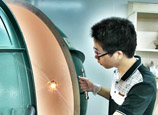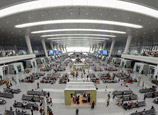
Initiative aims to help patients live longer and healthier lives
The central government may expand free treatment for HIV/AIDS patients in response to international calls for earlier and appropriate treatment, according to a senior official.
Wu Zunyou, director of the National Center for AIDS and Sexually Transmitted Diseases Control and Prevention, was speaking on Tuesday after the World Health Organization issued new HIV/AIDS treatment guidelines highlighting earlier antiretroviral therapy, or ART.
It urged countries to initiate treatment among patients with a CD4 cell count - an indicator of the seriousness of an HIV-related illness -of below 500 cells per cubic millimeter. A patient at this stage usually still has a strong immune system.
The previous recommendation, issued in 2010, was to start treatment at 350 CD4 cells/mm3 or below.
"The top health authority is looking at offering earlier treatment to the infected, which would help people with HIV live longer, healthier lives and reduce the risk of transmitting HIV to others," Wu said.
He said an assessment study is underway to evaluate the initiative, but did not give a timetable.
Currently, infected pregnant women and couples, where one side tests positive for HIV, receive free medication regardless of their CD4 count. Wu said the project will help the government decide whether to initiate earlier treatment nationwide.
"We have to make sure of both the benefits and potential defects of the initiative before we carry it out in full on the mainland," he added.
On the Chinese mainland, more than 170,000 people with HIV are on ART, according to the center's surveillance system.
The current national recommendation is to offer ART for patients with 350 CD4 cells/mm3 or below.
"With a 500 standard, we might have another 50,000 people eligible for free treatment, which would incur an additional cost of 300 million yuan ($48.8 million) each year for both examinations and medication," Wu said.
But he stressed that the money would be well spent in light of international experience.
Worldwide, about 90 percent of countries have adopted the 350 CD4 standard, according to the WHO. Others, including the European Union countries, Brazil and Argentina, have been offering ART at the 500 standard. In the United States, patients can receive treatment regardless of their CD4 count.
Wu said that earlier treatment is expensive but leads to fewer HIV infections, opportunistic infections and deaths.
"It's about paying now, or much more later," he said.
Zhao Yan, deputy director of the national center's office of treatment and care, said China has already stated in its treatment guidelines that sufferers aged 65 and over, or with their CD4 count dropping fast, are eligible to receive ART at 500 CD4 cells/mm3 or below.
"Such an initiative not only helps the infected but also the public, as earlier treatment could reduce the HIV viral load of the sufferers and thus lower the possibility of further transmissions," she said.
But she conceded that the number of such groups receiving ART remains quite low, citing reasons such as low awareness, particularly among clinical doctors.
"Some doctors, especially at grassroots level, have no idea about earlier treatment," she said.
Zhao Min, a Wuhan-based HIV/AIDS specialist, said doctors should be well trained to prepare for implementation of the new guideline.
Xiao Tang (not his real name), a 32-year-old patient in Beijing who has been on ART for four months, said, "I've learnt that early treatment helps lessen side effects and has a better outcome, but taking the pills on time is a must", adding that he has been struggling with occasional dizziness and nausea from the drugs.
After he began treatment at a designated outlet in Beijing, "I was asked to sign a written consent for ART by doctors, who also informed me of potential adverse reactions and other information I should pay attention to," Xiao said.
"It's an international trend to treat earlier. But this had better achieve the expected outcome of lowering AIDS deaths and averting further infection if the government is to secure good drug supplies," he said.
At the moment, those who develop resistance to eight or nine antiretroviral drugs provided free by the government have to pay for other drugs themselves, according to Xiao.
Xiao Dong, who heads an organization committed to controlling HIV/AIDS among the gay community in Beijing, welcomed the early- treatment initiative.
"That helps prevent potential opportunistic infections and blocks secondary infections," he said.
However, he was concerned about potential drug resistance developing earlier with this treatment.
"If the sufferers are not prepared, particularly on medication compliance, drug resistance will develop early, which will challenge their future drug choice,"Xiao Dong said.
To pave the way for the new initiative, training and education - such as how to handle potential adverse reactions - should be provided, in particular to grassroots doctors and patients, he suggested.
There are about 380,000 people with HIV/AIDS on the mainland, official statistics show.
















 China's weekly story (2013 6.22-6.28)
China's weekly story (2013 6.22-6.28)


![]()
